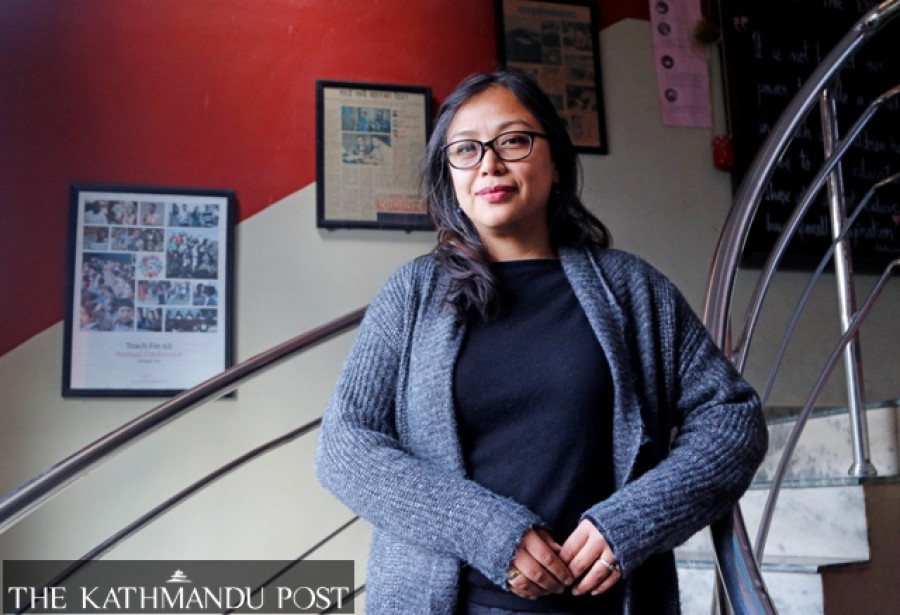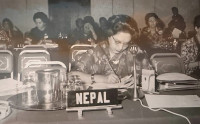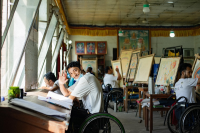Culture & Lifestyle
'Our country needs teachers who have high aspirations for their students’
Teach for Nepal’s CEO Swastika Shrestha sheds light on her organisation’s efforts to better Nepal’s public school system and what stakeholders can do to improve the system.
Ankit Khadgi
On January 7, Teach For Nepal received ‘The HRM Awards for Corporate Excellence for the Best Social Enterprise award.’ For Swastika Shrestha, CEO and co-founder of Teach for Nepal, the award reminded her of the importance of giving continuity to her organisation's work.
“There are times when we feel sceptical about whether our work is making an impact or not. But winning an award and getting appreciated for our efforts reassure us that we are going in the right direction,” says Shrestha.
Founded in 2012, Teach for Nepal (TFN) is a social enterprise that works to improve the quality of education of public schools in the country. Every year since its inception, the organisation has been offering two-year fellowship to university graduates and young professionals and sending them to teach in public schools across the country. The fellows teach students up to the secondary level.
According to Shrestha, TFN currently has 106 fellows teaching at various schools across the country, and they collaborate with the local teachers and introduce new ways of learning and teaching.
In this interview with Post’s Ankit Khadgi, Shrestha talks about her organisation’s achievements, the training their fellows receive, and how stakeholders of Nepal’s public schools can better the system and deal with crises such as the pandemic.
Excerpts:
TFN has been working in the public education sector for almost a decade. As the co-founder and the CEO of the organisation, what kind of changes have you personally seen in Nepal’s education system in those years?
In this one decade, many things have changed. Earlier, the issues concerning public schools weren’t highlighted as much as they should have been, and the discourses and dialogues around them were limited. There was no sense of urgency among the stakeholders or the realisation that their collective efforts could solve the problems in Nepal’s public school system.
But now, people are having conversations on how to improve public schools. The constant dialogues have made us aware that we don't always need big solutions to solve our education system's problems. A small viable solution like giving space to young people to lead and teach can also resolve many issues.
Similarly, another important change I have personally witnessed is the emergence of young people in the teaching sector. In the past, teaching was a profession that was looked down upon. But now, the mindset has shifted, and young and vibrant people are showing interest to be teachers.
It’s also important to acknowledge that the community schools are also showing interest in making school a place where innovative and progressive thoughts can thrive. The schools we work with willingly cooperate with us and are open to adapting to new teaching methods; there’s no reluctance in them like before, which I think is a good change.
What do you think are the major challenges Nepal’s public education system faces?
I think the challenges are known to all. Some of the key challenges that public schools face are the lack of needed physical infrastructure, scarcity in the number of teachers, and the attendance problem of the students. But I believe these challenges can be solved with simple solutions.
On the other hand, the major challenge is the conflicting ideas between what public schools consider important and urgent and what they should actually give thoughts to.
For instance, academic institutions don’t pay attention to the urgent need of laying a solid foundation in schools, where communication between teachers, guardians, and students is valued. A strong relationship and collaboration between teachers, parents, and the principles of the schools to tackle the problems is also missing, due to which things aren’t shifting.
TFN often introduces itself as a movement in Nepal’s educational sector rather than a social enterprise. In its ten years of operation, what kind of a movement and changes TFN has brought in the public education sector?
We like to call TFN a movement because we believe that we still have a long way to go to reach our destination. We want to create schools where every student can receive a qualitative education. However, reaching there takes a lot of effort and collaboration of many stakeholders.
While there are many ways of changing the current educational ecosystem, TFN contributes to the movement by nurturing future leaders. Our enterprise's core focus is to groom future leaders who can bring solutions to the problems faced by our education system. Every year, the fellows we send do not just learn how to teach, but they also identify themselves and the society in depth. As we allow them to develop the skills a leader requires, they realise their potential to contribute to society and bring change.
Almost 60 percent of our alumni (past fellows) have changed their career trajectory to work in the educational sector and are contributing to the development of education either through teaching or opening schools. Some are even starting organisations to solve the other problems of our system.
That’s how I believe TFN has contributed to the movement of improving the public education sector of the country. We invest in leadership, and the leaders we have created through our programmes are solving the issues around our public school system through their efforts.
What are the qualities TFN looks for in its fellows?
From the pool of diverse applicants, we pick those who are driven to bring social change. While their past academic performance also plays a vital role, the kind of fellows we select usually take the fellowship not just as a job but as an opportunity to bring positive changes to society. The leadership track of an applicant also determines their selection.
In short, we take the best of the best as our fellows.
How does TFN prepare its fellows?
Before our fellows start teaching, they go through a rigorous six-week training. Once the fellows start teaching in their designated places, they undertake three to four other training programmes, which are conducted every three months. From making them read books, teaching them about school management skills, to helping them develop pedagogies that every student can easily understand, the fellows receive multiple training throughout their fellowship. These programmes help them become a better teacher and a leader.
But as an organisation, we make sure that besides teaching skills required for teachers, our fellows also learn many other significant skills like self-reflection and empathy. Teaching is a laborious profession; it can be exhausting at times. Thus, it’s essential for those involved in this profession to be more empathetic towards people. And to make our fellows empathetic, we do many things. We create an environment where they can self-reflect on their own biases, learn/unlearn ideas, and develop a sense of purpose that motivates them to do their job efficiently.
The pandemic has severely affected the educational sector, and because of the digital divide, many students studying at public schools have been forced to compromise with their studies. As someone who runs a collective of educators, in your opinion, what could have been done differently?
We need to credit the Covid-19 pandemic for opening our eyes to how our educational system isn’t strong enough to handle crisis situations. Although every stakeholder, from the government to non-governmental organisations, worked to deliver the best, we have to admit that we all failed miserably.
There was no proper channel of integration in the mediums of learning. What teachers were teaching online was different from the lessons disseminated on radio and television. We could have prevented all of this if all of us had come together to find solutions.
There was no communication and collaboration among stakeholders. Everyone was trying to figure out solutions independently and couldn’t work collectively to solve the issues.
Therefore, in my opinion, the government should form an emergency education unit and task it to find possible solutions to tackle the challenges such crises can bring. Since the government has the biggest role among all the stakeholders, they can plan many things like allocating funds and even developing effective integrated programmes for students, so they don’t have to compromise with their education.
In your opinion, what kind of teachers do you think our academic institutions need?
I think our country needs teachers who have high aspirations for their students. They should have the ability to see their students’ potential and ensure that the students get the best growth opportunities.
To be a teacher requires a big commitment. The future of a child depends on them. That’s why we should have more teachers who are self-aware about their responsibilities and determined to provide a better learning environment for their students.




 16.24°C Kathmandu
16.24°C Kathmandu















